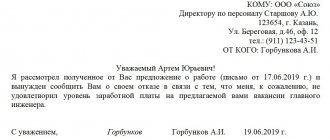The court leaves the application without consideration if: the plaintiff does not comply with the pre-trial procedure for resolving the dispute established by federal law for this category of cases or provided for by the agreement of the parties; the application was filed by an incompetent person, with the exception of this person’s application for recognition of his legal capacity, a petition for the restoration of missed procedural deadlines in the case of declaring this person incompetent; the application was signed or filed by a person who does not have the authority to sign it or bring a claim; in the proceedings of this or another court, arbitration court, there is a previously initiated case on a dispute between the same parties, about the same subject and on the same grounds; there is an agreement of the parties to transfer this dispute to the arbitration court for consideration and resolution and the defendant, before the start of the consideration of the case on the merits, received an objection regarding consideration and resolution of the dispute in court; the parties who did not ask for the case to be heard in their absence did not appear in court for a secondary summons; the plaintiff who did not ask for the case to be heard in his absence did not appear in court for a secondary summons, and the defendant does not require consideration matters on the merits.
What is leaving a claim without consideration?
Such action by the court is aimed at eliminating identified errors previously made in the process. Most often, they are possible when filing an application in court to resolve a controversial issue. Despite the fact that the claim was considered and a decision was previously made on it, the law provides for the possibility of correcting procedural errors by leaving the claim without consideration.
The plaintiff should be aware that the mere filing of an application does not mean that the legal process will be launched automatically.
The court examines the claim and makes a further verdict on it:
- Accept the claim. This resolution starts the proceedings to resolve the dispute.
- Return. The reason is that the controversial issue can only be resolved by another court.
- Leave the claim pending. This may be due to minor errors that will not be difficult for the plaintiff to correct.
- Refuse. This happens if the court has previously made a decision on a similar issue.
In order for the claim to be accepted for proceedings and the court does not have reasons to leave it without consideration, the following requirements must be met:
- The parties to the process must be legally identified.
- Jurisdiction is determined by the rules.
- All procedural deadlines were met.
- The form of application must comply with the rules.
- The document must meet all stated standards.
- Availability of the required number of copies of the claim.
- Attach a receipt for payment of the state duty.
The main reasons why a claim may be left without consideration are listed in the Code of Civil Procedure of the Russian Federation. They are set out in Article 222. Today, the lists of pretexts are completely exhaustive and other motives cannot leave a claim without consideration. The court also does not have the right to expand these lists at its discretion.
The arbitration court has its own lists. They can be viewed in Article 148 of the Arbitration Procedure Code of the Russian Federation.
Important! The court's decision to leave the claim without consideration does not prevent the plaintiff from re-filing an application on his controversial issue.
If one of the parties disagrees with the court's verdict, it is possible to appeal this decision to a higher authority.
Download the Petition to leave the statement of claim without consideration
How to cancel
In addition to a private complaint, a party to the case may file an application to cancel a previously issued ruling. To the same court that sentenced him. And only when it was issued for the following reasons:
- the parties (both) did not appear in court for the second summons and did not file an application for the hearing of the case in their absence
- The plaintiff in the secondary summons did not appear in court, did not ask to consider the case in his absence, and the defendant did not demand to consider the case on its merits.
The applicant must prove that he had valid reasons for not appearing in court. This could be illness, business trip, change of residence, etc. But not only. It is also significant that the applicant could not communicate the existence of such reasons to the court. That is, there were such circumstances that he objectively could not inform the court about the impossibility of appearing at the court hearing. The interested person may appeal the court's decision to refuse to satisfy the petition to cancel leaving the application without consideration.
Reasons
Launched paperwork is not yet a guarantee of success for the applicant. If the judge, during the proceedings, reveals procedural errors, then he has the right to issue a special ruling. It will mean that the claim remains without consideration.
This can only be done under strictly defined circumstances. They are set out in Articles 222 and 223 of the Civil Procedure Code of the Russian Federation!
Since the arbitration court mainly hears disputes that affect economic relations, they have their own lists of reasons why a judge can make a special ruling. And although they are very similar to the motifs from the Civil Procedure Code, they take into account special nuances. And making a decision requires compliance with established procedures specifically for this court.
In civil proceedings
The main reasons for issuing a special ruling in civil proceedings:
- This court is already considering a similar case. Or an identical claim is being considered by another court.
- Both parties did not follow the procedure for pre-trial settlement of the dispute, which must be carried out without fail.
- The parties may have committed a significant violation of the law or contract.
- The plaintiff, without a request for a hearing to be held without him, did not come to the hearing again. Provided that the defendant avoids proceedings.
- The disputants decided to sign an arbitration agreement during or before the proceedings. However, one of the parties does not want an ordinary court to consider this case.
- The application was submitted by the plaintiff's representative, but the power of attorney to conduct business was not drawn up correctly.
- Both parties, without submitting a request to consider the case without their participation, do not appear in court.
- The claim was filed by an incapacitated citizen. The exception is a statement from such a citizen in which he asks to be recognized as legally competent.
According to the civil code, only two reasons can serve as grounds for dismissing a case completely. This is a duplication of claims and the refusal of one of the parties to hear the case in this court, with the requirement of arbitration. The remaining motives are quite easy to correct. For example, if the person responsible for missing a hearing provides convincing evidence that his failure to attend the hearing was for a valid reason, then he can file a complaint. After consideration of which, the court hearing will continue.
Significant reasons may be:
- Treatment in a hospital.
- Man-made accident.
- Natural disaster.
- Accidents that do not depend on the plaintiff's driving.
In arbitration proceedings
In the arbitration process, most of the grounds are repeated from the civil code. In particular, the first six points from the previous list are the same for the arbitration court. But there are also quite specific reasons:
- The case was opened to establish a legal fact, but during the hearing a controversial question of law arose.
- The stated claim is related to a bankruptcy case.
- The case cannot be heard by an ordinary court, since the claim concerns a demand to pay legal costs. And you need to be guided by Article 112 of the Arbitration Procedure Code of the Russian Federation.
Commentary on Article 222 of the Code of Civil Procedure of the Russian Federation
1. Leaving an application without consideration, as well as terminating proceedings in a case, are forms of ending the trial without a court decision. Both of these forms are united by a common goal pursued by the legislator.
On the one hand, this is the elimination of a judicial error made when accepting a statement of claim, or the error of a person who applied for judicial protection with any violations or due to an erroneous belief about his violated (challenged) right or legitimate interest and the possibility of its protection in civil proceedings . This is evidenced by a comparative analysis of the grounds for leaving the statement of claim without progress, returning the statement of claim, as well as the grounds for terminating the proceedings and leaving the statement without consideration.
On the other hand, in these procedural institutions (leaving the application without progress and terminating the proceedings), the principle of procedural economy has found a clear expression, which allows, under certain conditions (for example, when the parties use the right to submit a dispute to an arbitration court, enter into a settlement agreement, or the plaintiff’s refusal from a claim, etc.) do not bring the trial to a decision on the merits, since in this case its further continuation loses all its meaning.
Leaving the application without consideration and terminating the proceedings is possible at any stage of the process after its initiation, if the court clarifies the relevant grounds. Both institutions contain an exhaustive list of grounds for their application, which are not subject to broad interpretation and addition by other grounds either by the court or by the persons participating in the case. If the application is left without consideration and if the proceedings are terminated, the court issues a ruling, which can be appealed to higher authorities in the manner prescribed by law.
Leaving an application without consideration is possible only after the issue of initiating a process has been resolved, otherwise, i.e. when clarifying the grounds specified in the commented article, at the stage of initiating civil proceedings, the norms of the institution of returning the statement of claim are subject to application (see commentary to Article 135 of the Code of Civil Procedure).
The difference between leaving an application without consideration and terminating the proceedings lies in the grounds and legal consequences of these actions. It is necessary to point out the relationship between the institutions under study and the concept of “right to claim” in its material and procedural sense.
Termination of proceedings usually occurs when a person does not have the right to judicial protection. Therefore, termination of the proceedings deprives a party of the opportunity to re-apply to the court with an identical claim.
Leaving an application without consideration is possible in cases where the plaintiff or applicant has the right to judicial protection, but the exercise of this right is currently excluded due to the presence of procedural obstacles or due to the lack of conditions established by law for such implementation. Thus, leaving an application without consideration does not deprive a party of the opportunity to re-apply to the court for judicial protection with an identical claim - between the same parties, on the same subject and on the same grounds. However, a repeated appeal in this case is possible only if the circumstances that served as the basis for leaving the application without consideration are eliminated (Part 2 of Article 223 of the Code of Civil Procedure).
The issue of leaving a claim without consideration is resolved by a court of general jurisdiction in a court hearing.
The commented article establishes a list of grounds for leaving a statement of claim without consideration. In addition, in Art. 263 of the Code of Civil Procedure provides another basis for leaving an application without consideration when, when considering a case in a special proceeding, it is established that there is a dispute about the law within the jurisdiction of a court of general jurisdiction. In this case, the application remains without consideration, and persons are explained their right to file a statement of claim in the general manner.
All the grounds for leaving an application without consideration, indicated in the commented article, can be divided into the following groups.
The first group includes the circumstances specified in paragraph. 2 - 5 of the commented article and indicating a miscarriage of justice when initiating a civil case, since the plaintiff or applicant did not comply with the conditions and procedure for filing a claim (application) established by law or contract.
The second group of grounds for leaving an application without consideration includes the circumstances specified in paragraph. 6 of the commented article related to the will and actions of the parties (applicants) participating in the case.
Finally, the third group consists of grounds indicating the objective impossibility of considering and resolving the case in this process due to direct instructions in the law, listed in paragraph. 7 and 8 of the commented article. Here we are talking about a kind of procedural responsibility in relation to the parties to the civil process (primarily the plaintiff) in connection with their failure to appear at the court hearing.
A ruling made by the court to leave the application without consideration can serve in accordance with Art. 443 of the Code of Civil Procedure as the basis for reversing the execution of a judicial act.
2. Paragraph 2 of the commented article speaks of the need for the plaintiff (applicant) to comply with the rules of conditional and mandatory jurisdiction when applying for protection of a violated or disputed right or legitimate interest.
The need to comply with the pre-trial or claims procedure for resolving disputes can be established by the current legislation or, due to the principle of discretion, by the parties themselves in the agreement they enter into (conditional jurisdiction). Most often, these rules apply to entities engaged in business activities. The agreement must contain clear provisions on the conditions and procedure for the claim settlement of the dispute or a clear record of the establishment of such a procedure.
In addition, the law may establish a strict sequence for seeking protection from certain jurisdictional authorities. Failure to comply with this sequence leads to a violation of the rules of mandatory jurisdiction. The application must be left without consideration, regardless of whether the plaintiff’s opportunity to comply with the claim or other pre-trial procedure for resolving the dispute with the defendant has been lost or not.
The court must take into account the provisions of Part 5 of Art. 11 of the Code of Civil Procedure, which allows the application of foreign law, which may also define a claim or other pre-trial procedure for resolving a dispute.
Compliance with the pre-trial (claims) procedure for resolving disputes is provided for, in particular: clause 2 of Art. 452 Civil Code, ch. XXV KTM, Art. 124 Air Code of the Russian Federation, section. IX Charter of Motor Transport of the RSFSR, Art. 37 of the Federal Law of July 17, 1999 N 176-FZ “On Postal Services” <1>, Art. 55 of the Federal Law of July 7, 2003 N 126-FZ “On Communications” <2> and other legislative acts.
——————————— <1> NW RF. 1999. N 29. Art. 3697. <2> NW RF. 2003. N 28. Art. 2895.
If the application is left without consideration on this basis, the court must resolve the issue of returning the previously paid state duty to the plaintiff (see subparagraph 3, paragraph 1, article 333.40 of the Tax Code).
3. During the trial, it may become clear that the application was submitted by an incapacitated person. Under these circumstances, further consideration and resolution of the case is impossible. The incapacity of a person is determined in accordance with the requirements of civil procedural legislation (see commentary to Article 37 and Chapters 31, 32 of the Code of Civil Procedure).
The established incapacity of a person must be related to the moment that person filed an application with the court. As a rule, this is only possible in relation to an individual, since the capacity and legal capacity of a legal entity are interconnected and are difficult to separate from each other, therefore, in relation to legal entities, it is more accurate to talk about their legal personality.
The incapacity of an individual may be due to his or her not reaching the age of majority at the time of filing the application - 18 years. This circumstance must be confirmed by the person’s birth certificate or other documents. However, a minor who has reached the age of 16 may personally exercise his rights and obligations in court, including independently filing a claim (application), if it is declared in accordance with the provisions of Chapter. 32 of the Code of Civil Procedure fully capable (emancipation). In addition, in cases provided for by law, in cases arising from civil, family, labor, administrative and other legal relations, as well as from transactions related to the disposal of earnings received or income from business activities, in accordance with Part 4 of Art. 37 of the Code of Civil Procedure, minors aged 14 to 18 years personally defend their rights, freedoms and legally protected interests in court.
The incapacity of a person recognized as incompetent due to a mental disorder is confirmed by a court decision that has entered into legal force. In this case, incapacity must be established before the person declared incompetent files a claim (application). In other cases, if a person loses legal capacity after filing a claim (application) and initiating civil proceedings, the court must be guided by the provisions of paragraph. 3 tbsp. 215 Code of Civil Procedure, i.e. suspend the proceedings until a representative is appointed to the incapacitated person (see commentary to Article 215 of the Code of Civil Procedure).
Leaving an application without consideration does not deprive the incompetent person of the right to judicial protection. A claim (application) in defense of the rights, freedoms and legally protected interests of incapacitated persons in respect of whom a decision has been made to leave the application without consideration may be re-filed by their legal representatives according to the general rules of the Code of Civil Procedure.
Recognizing a person as having limited legal capacity and appointing a guardian for him or her does not entail leaving the application without consideration, since these actions do not deprive the person of the right to personally initiate a case in court.
4. The basis for leaving a statement of claim without consideration is also the absence of a signature on the application submitted to the court, the signing of the application by a person who does not have the authority to perform this action, or by a person whose official position is not indicated.
The absence of a signature on the submitted claim (application) does not allow the court to establish the actual will of the person regarding the need to protect his violated rights, which entails leaving the application without consideration.
Every individual or legal entity has the right to bring a claim to court personally or through a representative (see commentary to Chapter 5 of the Code of Civil Procedure). Regardless of the type of representation (legal, contractual or otherwise), it must be properly formalized in the manner prescribed by law. An appeal to court by a person whose powers are not properly formalized is a violation of the principle of discretion. It should be noted that Art. 54 of the Civil Procedure Code separately identifies special powers that must be noted in the power of attorney: the right to sign a statement of claim and the right to present it to court. The absence of at least one of these powers in the power of attorney should entail the grounds established in paragraph. 4 commented articles.
A legal entity is represented in court by its bodies, determined by laws, regulations or their constituent documents, or by its representative authorized for this purpose by the legal entity. The powers of the head of the organization are confirmed by documents submitted by him to the court, certifying his official position, and, if necessary, by constituent documents (charter, agreement). Therefore, if a claim (application) is signed on behalf of a legal entity by a person whose official position is not indicated, then it is not possible for the court to conclude that this person has the authority to sign the claim (application). In this case, a ruling must be made to leave the application without consideration.
The judge at the preparatory stage may ask the plaintiff to provide evidence confirming the person’s authority to sign the statement of claim. If the specified evidence is not provided, the arbitration court must make a ruling to leave the statement of claim without consideration in accordance with paragraph. 4 commented articles.
5. The basis for leaving the application without consideration will be the presence in the proceedings of this or another court of general jurisdiction, arbitration court of a previously initiated identical case - on a dispute between the same parties, on the same subject and on the same grounds. In the specified identical case, the proceedings should not be completed, otherwise if there is a court decision or a court ruling that has entered into legal force, made on a dispute between the same parties, on the same subject and on the same grounds, to terminate the proceedings in connection with If the plaintiff renounces the claim or approves a settlement agreement between the parties, then this will be grounds for terminating the proceedings (see commentary to Article 220 of the Code of Civil Procedure).
Unlike the Arbitration Procedure Code, the Code of Civil Procedure does not say anything about the consequences of discovering during the consideration of a case an identical case (in a dispute between the same persons, about the same subject and on the same grounds) in the proceedings of a competent court of a foreign state or an arbitration tribunal.
6. The agreement of the parties to consider the dispute by an arbitration court (arbitration clause), drawn up in accordance with the current legislation, indicates the intentions of the parties to consider a possible dispute in an arbitration court. However, the presence of this agreement (arbitration clause) is not an obstacle to any party seeking protection of their violated rights and legitimate interests in court, which is confirmed by Art. 3 GPC.
This basis is a novelty for the Code of Civil Procedure, previously in Art. 221 of the Code of Civil Procedure of the RSFSR it was absent.
However, in the current version, it can be applied provided that the defendant, before the start of consideration of the case on the merits (before the start of the second stage of the trial), prevents the consideration of the dispute on the merits in civil proceedings, stating his objection on this basis. Satisfying the said application of the defendant, the court must check the agreement of the parties to consider the dispute by an arbitration tribunal (arbitration clause) for its validity, loss of force and possibility of execution. If the agreement under investigation (arbitration clause) is invalid, has lost force or cannot be executed, the court refuses to satisfy the defendant’s request for a ruling to leave the application without consideration and considers the case on the merits.
On this basis, the statement of claim can be left without consideration only in the court of first instance.
7. A party to a case has the right to ask the court to consider the case in his absence for various reasons, but the court has the right to recognize the party’s participation in the case as mandatory and oblige the party to appear in person in court to give explanations.
The basis for leaving the application without consideration will be the failure of the parties to appear, who were properly notified of the time and place of the court hearing, who did not request the case to be heard in their absence, and whose failure to appear is not due to valid reasons. The law makes the application of this basis dependent on which court hearing the parties did not appear at the same time, namely on a secondary summons. The introduction of this basis is aimed at strengthening the discipline of the parties involved in the consideration of a civil case.
Failure of the parties to appear without good reason can lead not only to leaving the application without consideration, but also to postponing the case and resolving the case on the merits, if the court considers this possible based on the materials available in the case. In addition, the failure of a party to appear may also serve as a basis for a default judgment (see commentary to Chapter 22 of the Code of Civil Procedure).
8. Paragraph 8 of the commented article is related to the situation that arose as a result of the failure of only one plaintiff to appear, while the defendant was present at the court hearing. The possibility of making a determination to leave the application without consideration in this case depends on the position of the defendant. If he insists on considering the case on the merits, then the court will not have the right to apply paragraph. 8 of the commented article and leave the application without consideration. The defendant’s demands to continue the trial of the case on the merits can be stated in writing or orally, with mandatory recording of them in the protocol.
In any of the above cases, leaving the application without consideration is a negative consequence for the active party in the process - the plaintiff (applicant), since he will have to again carry out actions to comply with the procedure for filing a claim (application) when re-applying to the court for judicial protection. In addition, the statute of limitations may expire, etc. At the same time, the effect of paragraph. 7 and 8 of the commented article are directed against negligent plaintiffs and applicants.
It must also be taken into account that the court, at the request of the plaintiff or defendant, cancels its ruling to leave the application without consideration on the grounds specified in paragraph. 7 and 8 of the commented article, if they provide evidence confirming the validity of the reasons for their failure to appear at the court hearing and the impossibility of reporting them to the court (Part 3 of Article 223 of the Code of Civil Procedure).
Consequences for the parties
Only pending applications can be left without consideration.
Important! This definition should not be confused with return or abandonment. These concepts can only be applied before the claim is launched into office proceedings!
Legislatively, the following consequences come into force for the parties involved in the process:
- Proceedings on the claim are completed.
- It is possible to resume the consideration of the case if the errors that led to the closure of the process are corrected.
- If you disagree with the court's decision, you can file a complaint with higher authorities.
In some cases, the applicant intends to seek termination of the process, ignoring the recommendations of the court. In other cases, interested parties can resume proceedings by eliminating procedural errors or appealing a court ruling.
Appealing a court decision
To cancel a court decision, an appeal is filed to higher judicial authorities within fifteen days. The facts in the complaint must be presented consistently and to the point. The main emphasis must be placed on non-compliance with the law and it is imperative to provide evidence confirming this.
Attention! The appeal is considered within sixty days from the date of filing and all parties who are interested in resuming the proceedings are invited to the meetings. The decision of the appeal court comes into force immediately.
When the trial is revived, the procedural deadlines are also renewed. The new review will take into account the previous limitation period.
Refund of state duty
When the claim is of a property nature, the state duty can be quite significant due to the high value of the disputed property.
To return the paid tax, you must provide the following documents to the tax service:
- Certificate of leaving the claim without consideration (obtained in court).
- Passport.
- Application for refund of state duty.
If the plaintiff does not intend to resume the lawsuit, then he can count on the return of the amount spent.
Application for reopening a case left without consideration
An application to reopen a case left without consideration is drawn up in accordance with the general requirements for the procedure for preparing documents in court.
Mandatory items are : full indication of the name of the judicial authority, as well as full name, address, contact telephone number and e-mail (if available) of the applicant himself and his position in the case.
The following are listed : the date of the ruling, the names of the parties and the essence of the claims, the essence of the ruling issued by the court and an explanation of the valid reason for non-compliance with the requirements that were an obstacle to the successful completion of the process.
The petition must indicate the reasons why the process was left without consideration.
Further, based on Art. 223 of the Civil Code of the Russian Federation, the applicant submits a request to cancel the judge’s ruling.
See in this article how to correctly draft an appeal against the reversal of a decision of the first instance court.
The list of documentary evidence attached to the application must be indicated at the end.
So, based on procedural law, there are legitimate opportunities to leave the case without consideration.
The defendant has the right to file a petition in connection with the plaintiff’s violation of the pre-trial procedure for resolving the dispute.
The judge himself may also act as an initiator, for example, due to the plaintiff’s absence from two consecutive hearings.
This is important to know: State duty and claim for the release of property from seizure: sample
In case of disagreement, there is the right to refer to Article 223 of the Code of Civil Procedure of the Russian Federation and demand the cancellation of the determination.
It is necessary to provide convincing evidence of the impossibility of your arrival in the courtroom and the absence of ways to warn the judge about this in a timely manner.
The plaintiff (applicant) has the right to file an application to reopen a case left without consideration (in accordance with Articles 331 and 223 of the Code of Civil Procedure and Article 148 of the Arbitration Procedure Code).
However, he must first eliminate these shortcomings. These requests are considered in the general manner.
Timing for resumption of production
The procedure according to which an application to reopen a case left without consideration is submitted is determined by Art. Art. 331 and 223 Civil Procedure Code and Art. 148 Arbitration Procedure Code.
These requests are considered in accordance with the general procedure.
According to Article 203 of the Code of Civil Procedure, the concept of “leaving a claim without consideration” means the cancellation of a break in the period specified by law.
The interested parties thus return to the pre-procedural state.
The end of the process on the points listed in Article 96 of the Code of Civil Procedure presupposes the return to the applicant, at his request, of the state duty he paid at the expense of budgetary funds.
Termination of judicial proceedings can be appealed to a higher court (Article 371 of the Civil Code of the Russian Federation). As a sufficient reason, the deprivation of a participant in the process of the opportunity for its further development is indicated.









